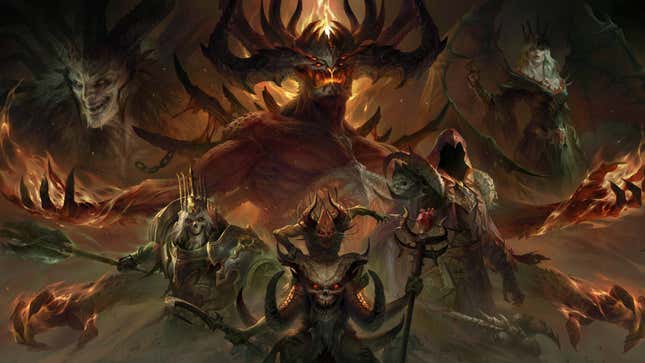
Diablo Immortal has been setting the internet alight with controversy. Every gaming website under the sun has a take about how the microtransactions ruin the gameplay and how Blizzard was ruining fans’ beloved childhood memories of Diablo. The game currently holds the lowest user score on Metacritic. Still more Diablo fans feel like this just isn’t a game designed for them. And they might be right. Despite its mobile origins, Immortal grew wax wings and flew too close to the PC gaming sun. For a loyal audience to whom Blizzard had pandered for years, that was considered unforgivable.
I get it. The monetization criticisms hold water, but the prospect of overspending isn’t always the actual reason why console gamers are so upset. The truth is simpler: Mobile represents another front in the never-ending culture war for the heart and soul of gaming. But I have to question if it has to be a war at all.
Before Immortal was announced, Diablo fans could safely ignore mobile games as “cash grabs” that would never affect the premium games that they wanted to play. But ever since Blizzard announced that the game would be a full Diablo experience, these gamers have felt threatened by what they perceive as mobile’s encroachment on “legitimate” gaming. In fact, the game raised so many concerns that Blizzard’s community manager had to clarify that Diablo IV would not have “mobile-style monetization.”
But it wasn’t enough for Blizzard to make promises to the fans. The press was also expected to fall in line with “Immortal is bad.” On June 4, there was an incendiary tweet from a Twitch streamer that lambasted journalists for saying that Diablo Immortal is…well, fun. I was unsurprised, because I was met with similar public hostility when I started writing about Genshin Impact. If a journalist is “too positive” about a mobile game, then a very vocal segment of gamers will decry them as a traitor to gaming and a corporate shill. To these players, the rise of F2P gaming is a virus that needs to be stamped out. Especially before it “takes over” gaming at large.
Despite all the background noise (or maybe because of it), I felt compelled to download Diablo Immortal and play for a bit. For context: I have never played a Diablo game before Immortal. The setting seemed too over-the-top for my tastes, and I wasn’t sure how to digest three games’ worth of lore before Diablo IV came out. Since so many games are constantly releasing, I made my peace with Diablo being one of those series that I would just never get into.
Diablo Immortal held my hand through the excruciating experience of getting into a widely beloved franchise 25 years too late. The equipment interface told me which gear had the best stats, and the footprints told me exactly where to go. The quests were structured in a way that made it easy for me to stop playing and then pick the game back up later. Best of all, Immortal didn’t loredump me as if I were a Diablo fan. All the stories were perfectly self-contained, and the world felt less intimidating for it. Immortal is how I learned to love Diablo.
Like, I get it now. The villains might be monstrous demons from hell, but their designs are killer. The voice acting is superb, and I grew attached to the side characters I met along the way. I’d always had the impression that Diablo is an edgelord game, but Immortal is full of heart. Every character in the game was willing to make steep personal sacrifices because they wanted to fight against the suffering that hell inflicted on innocent people. What’s not to love about that?
All of these factors likely played a huge part of why Diablo Immortal has 10 million downloads despite a 0.2 user score on Metacritic. There’s a huge disconnect between the internet commenters who consider themselves the stewards of gaming and the actual audiences who enjoy playing Diablo as a F2P game. I’m not here to tell anyone that they should enjoy Diablo Immortal. I have friends who can’t gel their brain against the live-service loop, just like how my brain bounces off certain types of puzzles.

Part of this problem is exacerbated by how Blizzard marketed the game. In order to cover for Diablo IV needing more time in development, the studio announced that Diablo Immortal is a “fully-fledged Diablo experience on mobile.” They quickly learned that this might have been a huge mistake.
I almost didn’t write this blog until I was at least level 60. I’d seen the blowback that my colleagues got for writing about the game “too early,” and I wanted to avoid that fate. But I was having such a relaxing time in Immortal, I just didn’t feel like rushing the content for the sake of proving myself to Diablo fans. That’s when I started thinking: maybe there’s something fundamentally broken about how PC and console games are consumed.
In a PC or console game, the expectation is that you get to sink a ton of hours into a game very quickly in order to become a godlike merchant of death. That’s not the way to play a mobile game. If any content feels time-gated or locked behind very low drop rates, it’s because you’re expected to play this game for years, not in the quick bursts between now and the next major AAA release. That means that the “wins” have to be less frequent too. It took me nearly a year to build up a team that was good enough to clear a major event in Arknights. I couldn’t imagine telling a “traditional” gamer that they’d have to grind a year to clear important content.
Of course, the gambling factor is a legitimate concern. Diablo Immortal won’t release in the Netherlands or Belgium due to their gambling regulations. Despite what haters might think about my Genshin blogs, I do think that federal governments should place restrictions on F2P games. At the very least, I don’t believe that children should be allowed to swipe credit cards on microtransactions. But the problem is that most critics of F2P games don’t actually understand the community or the motivations of mobile players. Console gamers are often justifiably upset at the ignorant gaming discussions in national media, but even gaming outlets don’t hold themselves to the same standards of nuance when it comes to mobile games. I’ve seen too many instances of mobile gamers being maligned as “casual.” Given almost all of the furious response to Immortal has been based around a vociferous defense of those prone to being exploited by in-game spending, where’s the empathy for the people that mobile critics claim to care about?
There absolutely needs to be a lot of discussion about the more predatory aspects of mobile gaming. But this can’t take place entirely from the perspective of a die-hard group of lifelong Diablo fans being angry that their favorite franchise has reached out to another audience. Ten million people downloaded the game because they wanted to, and while protecting the most vulnerable among their number is an admirable goal, it’s perhaps not always the genuine reason for the outcry.
Immortal faced backlash for the same reasons that the western audience reacted so strongly to Genshin Impact. It has a PC port, and it’s high-quality enough to disguise its mobile-first approach. But that doesn’t change that these games were made for a very different gamer in mind. So there’s no need for PC and console players to feel threatened by Immortal. Blizzard is angling for a much bigger fish—the mobile community that already represents the gaming majority.